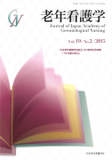Japanese
English
- 販売していません
- Abstract 文献概要
- 参考文献 Reference
抄録
本研究の目的は,世代特性をふまえた高齢者ケア教育に資するため,ゆとり世代の看護大学生に焦点をあて,学習前の高齢者像(4視点)の特徴と,高齢者との接触状況(同居経験,会話頻度)やケアへの関心度との関連性について明らかにすることとした.研究方法は,対象者に無記名の質問紙調査を行い,180名の回答をテキストマイニングと統計的手法により分析した.結果,<普段みたり聞いたりする像>では,【同居中】群は身体の加齢変化を捉えていた.【同居なし/会話が乏しい】群では,病気・障害・痛みをもつ状態像が多かった.<将来なりたい像>は,【同居中】群は生活の質を,【同居なし】群は外見・若さを重視する傾向があった.<将来なりたくない像>は,【過去同居】【同居なし】群で高齢者の表面的な言動をネガティブに捉えた表現が多かった.<自分にとっての存在>について,大多数は敬愛・尊重を示す回答であった.しかし,【会話が乏しい】【同居なし】群の少数の学生が,歳を重ねることへの嫌悪感や,高齢者と関わることへの拒否的心情を示し,ケアへの関心が低かった.本研究を通して,ゆとり世代の特性や生活背景をふまえ,初年次からマスメディアに惑わされない批判的思考力を高めるとともに,地域社会との連携のもと高齢者との交流体験を増やし,高齢期のイメージを再構築できるような新しい教育環境・方法が必要であることが示唆された.
The purpose of this study was to clarify the association among the characteristics of pre-educational images of elder people (based on four viewpoints), contact situations with them (living-together history and frequency of conversations), and degree of interest in elderly care, targeting nursing students in Yutori-Generation, for the development of elderly care education based on the characteristics of the generation. We conducted an anonymous questionnaire survey and analyzed the responses from 180 students with text mining and statistical method. In the answers for “Typical images, seen and heard”, the “Living together” group quoted the changes brought about by aging. On the other hand, many students in the “Never lived together” and the “With little conversation” groups held the images of conditions with diseases, impairments, and pains for elderly people. As for “Ideal images”, the “Living together” group showed a tendency to focus on quality of life, however, most answers from the “Never lived together” group attached value to appearance and youthfulness. In the answers from the “living together in the past” and the “Never lived together” groups for “Undesirable images”, a number of expressions which indicated negative feelings or emotions toward superficial words and deeds of elderly people were found. A majority of answers for “Meanings in the existence to you” indicated adoration and respect toward them. However a small number of students in the “With little conversation” and the “Never lived together” groups held the feeling of repulsion in getting old and rejection toward involvement with elderly people, and showed low interest in elderly care. These findings indicate that new educational environment and methods are required to cultivate critical thinking which is not influenced by mass media, create more occasions for interactions with elderly people through cooperation with local communities, and reconstruct images of old-age from the first-year at the university, based on the characteristics and living background of Yutori-Generation.
Copyright © 2015, Japan Academy of Gerontological Nursing All rights reserved.


